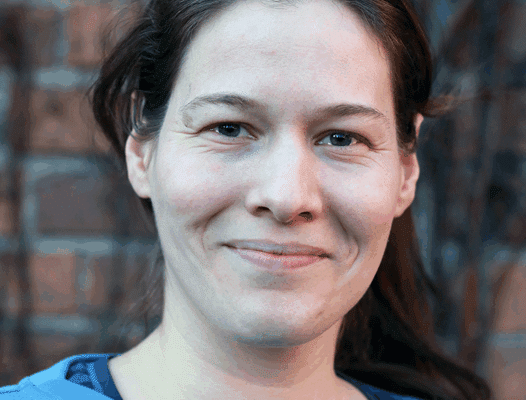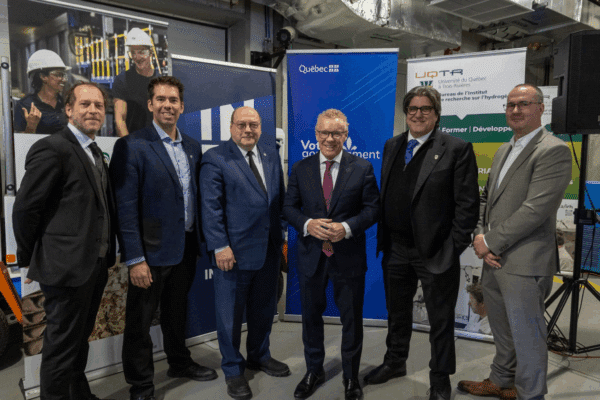- Research
A research team led by INRS launches a study on the socio-environmental impacts of telework by measuring the CO2 emissions of its community

What are the environmental impacts resulting from post-pandemic changes in our work practices? That question will be explored by a team from the Institut national de la recherche scientifique (INRS), in collaboration with Polytechnique Montréal, as they launch a study on the CO2 emissions balance, which includes the effects of the INRS community’s commute to and from work. This unprecedented participatory research project, financed and supported by the Montreal Climate Partnership and INRS, reflects a commitment to take concrete action to address the climate emergency.
“Given the climate emergency, every action counts.”
Louise Hénault-Ethier
“With this project, INRS is taking concrete action to better understand the impacts of mobility changes in its community and to accelerate climate transition,” says Louise Hénault-Ethier, Associate Professor and director of the Eau Terre Environnement Research Centre at INRS who initiated this new study.
Understanding the impacts of mobility and telework on the carbon footprint
INRS adopted a telework policy in June 2021 and seized the opportunity to properly identify and measure the environmental impact of the implementation of this policy, initially motivated by social issues. INRS had already carried out a first assessment of the direct CO2 emissions of its community’s professional commuting from the workplace for the period 2020-2021.
The research team will quantify greenhouse gas (GHG) emissions by modeling the INRS community, including faculty members, student members, and administrative staff, travelling between home and work. It will include both the CO2 emissions avoided by working from home and the increased emissions associated with the use of computer servers during numerous virtual meetings.
“Based on data for direct GHG emissions, we are going to integrate a tool that will allow us to identify, calculate and offset emissions associated with work-related travel. As far as I know, this is a first,” explains Professor Louis-César Pasquier, a specialist in carbon sequestration at INRS.
“With this new study, we are taking a step further to understand the impact of individual mobility choices on the carbon balance.”
Louis-César Pasquier
INRS will collaborate with the team of Professor Catherine Morency, head of the Mobility Chair and the Canada Research Chair on personal mobility at Polytechnique Montréal. With the expertise of Polytechnique, the team will be able to survey and model the mobility behaviours of study participants within the INRS community. This includes daily habits and their impacts, relocations that prolong less frequent work-related travel, changes in motorization, or the growth of certain other leisure-related trips.
“The new habits that people will keep after the pandemic will undeniably have an impact on the carbon footprint,” says professor Morency.
“In fact, many organizations are concerned about the repercussions of telework. Understanding and quantifying the effects of telework requires measuring a range of behaviours, from changes in the modes of transportation used to get to work to urban sprawl, which could increase commuting distances and reduce the availability of more sustainable transportation options,” she says.
A project that mobilizes a whole community
The methodology developed for the INRS data can be applied to collaborators of the Montreal Climate Partnership, who wish to undertake mobility commitments within the framework of Les grands gestes campaign, made possible by the Foundation of Greater Montréal, the Trottier Family Foundation, the City of Montreal, the financial contribution of Cogeco and nearly a hundred other partners. The mission of the Montreal Climate Partnership is to mobilize economic, philanthropic, institutional and community forces to accelerate the decarbonization of Montreal.
“This study will complement the other initiatives of the Montreal Climate Partnership targeting employee mobility, as it will allow us to scientifically confirm the relevance of promoting certain practices over the medium term,” says Mélanie Le Berre, Executive Director of the Montreal Climate Partnership.
With the findings, the Montreal Climate Partnership hopes to make recommendations to Montreal organizations on how to reduce their carbon footprint, while taking advantage of the economic benefits of telework and other new practices.
Research team includes Louise Hénault-Éthier, Louis-César Pasquier, Philippe Apparicio from INRS, Catherine Morency, Owen Waygood, and Hubert Verreault from Polytechnique Montréal.



